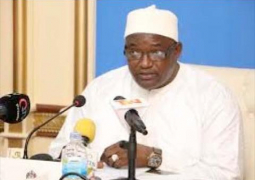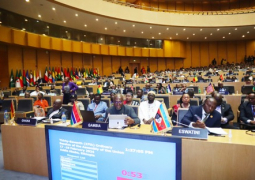
The Ministry, in collaboration with the Food and Agriculture Organization (FAO) of the United Nations with the facilitation of Alliance Française Banjul and Gambia Tech, held a day-long Investment Forum that dilated on potential investment opportunities in Agrifood.
Held on Thursday 10 October at the Sir Dawda Kairaba Jawara International Conference Center in Bijilo, the forum was designed to facilitate discussions that would help identify potential investment opportunities in the agricultural sector, focusing on innovative financing models, public-private partnerships, and foreign direct investment.
The forum was conducted under the FAO Hand-in-Hand (HIH) Initiative, which supports the implementation of nationally led ambitious programmes to accelerate agrifood systems transformations by eradicating poverty (SDG1), ending hunger and malnutrition (SDG2), and reducing inequalities (SDG10).
The initiative promotes partnership-building efforts and provides a platform for national authorities to present investment opportunities to investors, multilateral development banks, the private sector and donors in an annual International Investment Forum in Rome, Italy.
In his keynote address, Demba Sabally, the Minister for Agriculture, Livestock and Food Security, said there are vital investment opportunities in the agricultural and natural resource sectors investors could explore and utilise lucratively.
The investment ventures, he said, could be done via focusing on innovative financing models, public-private partnerships, and foreign direct investment.
Minister Sabally reiterated that the private sector is a key player in ensuring food safety as it underlies the entire food system, saying the majority of foods are produced, handled, processed, distributed, and sold by the private sector, hence their responsibility to ensure that products are nutritious and safe for consumption.
Shibu Rampedi, FAO Representative in the Gambia, said public-private partnerships can stimulate innovation, introduce advanced technologies, and build capacities of local producers.
Such collaborations, she states, are essential in promoting the commercialisation of agricultural commodities, which is a key focus of the Hand-in-Hand Initiative (HIHI).
The HIH Initiative promotes principles such as prioritising countries where poverty and hunger may be high, matchmaking, bringing together governments and the private sector and facilitating the process and focusing on SDG targets.
“FAO’s Hand-in-Hand Initiative supports the principles by facilitating informed planning and decision-making, ensuring that investments are targeted, data-driven, and geared towards sustainable outcomes,” she said.
UNFPA Country Representative Ndeye Rose Sarr, who represented the United Nations Resident Coordinator in The Gambia, reaffirmed that the United Nations Country team in The Gambia “remains deeply committed to supporting” the country’s agricultural sector through strategic partnership building, including those with the private sector, investors and financiers.
Agriculture has the potential to play a key role in meeting the SDGs — particularly those related to poverty eradication, food security, and economic growth, Ms Sarr said, adding: “The UN Sustainable Development Cooperation Framework 2024 – 2028 prioritises agrifood systems transformation as part of a broader agenda for sustainable development.”
She stated further: “The UN FAO’s Hand-in-Hand Initiative is indeed designed to support food systems transformation by enhancing informed planning and decision-making for investment and commercialization as well as building partnerships.”
By providing support to minimise investment risks and investment optimised benefits, she said, the UN aims to align agrifood systems with emerging market opportunities, enhance productive capacities and empower value chain stakeholders to participate effectively in local and international markets.
“The role of the UN FAO as exemplified in the UN Sustainable Development Cooperation Framework 2024 – 2028 is to enhance agrifood systems transformation and to promote sustainable practices through technical and financial support geared towards improving food security, building resilience to climate change, and contributing to national economic growth,” Madam Sarr said, adding that the private sector is highly essential in this, not only as a provider of capital but as a major driver for job creation, and infrastructure development.
The United Nations is working to create an enabling environment that aligns private investments with sustainable development priorities, she informed, saying the forum served as an ideal platform for policy-makers, donors, investors, and other partners to engage in meaningful discussions on agrifood system transformation, innovative financing models, and public-private partnerships.




